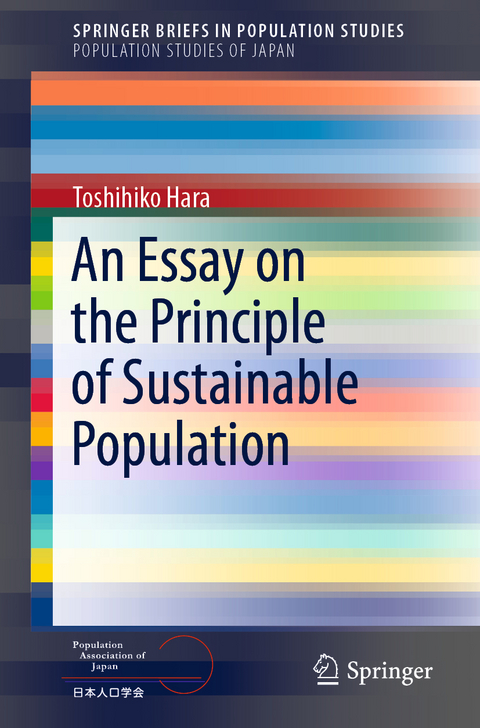
An Essay on the Principle of Sustainable Population
Seiten
2020
|
1st ed. 2020
Springer Verlag, Singapore
978-981-13-3653-9 (ISBN)
Springer Verlag, Singapore
978-981-13-3653-9 (ISBN)
This principle of sustainable population indicates that the demographic transition must follow a logistic curve.Using a system dynamics approach, the author constructs a simulation model based on four major loops: fertility, reproduction timing, social capital accumulation, and lifespan.
This book focuses on the future of the global population and proposes revising Malthus’ Law. The United Nations estimates that the global population will top 11 billion by 2100, at which point its growth will be near an end: it will find a new equilibrium in a long demographic transition from high birth and death rates to low ones.
However, the author reviews the fertility developments reported in the World Population Prospects 2017, which are near or below the replacement level in most regions, with the important exception of Sub-Saharan Africa, and warns of a possible scenario of the extinction of human society. Returning to Malthus, his Essay on the Principle of Population is critically reconsidered. Simple simulations show that exponential growth and decay are unsustainable beyond the narrow ranges of the net reproduction rate. In addition, the length of reproduction periods, which depends on women’s lifespans, plays a pivotal role. The limits of growth are given in any case, to the extent that time and space will permit.
From this perspective, teleological conditions such as instinct, passion, or even natural reproductive tendencies are irrelevant and unnecessary. When the population deviates too far from the replacement level, either its shrinking or massive growth will overshoot the limits of its existence. This principle of sustainable population indicates that the demographic transition must follow a logistic curve.
Using a system dynamics approach, the author constructs a simulation model based on four major loops: fertility, reproduction timing, social capital accumulation, and lifespan. Using only endogenous variables, this model successfully reproduces the historical process of the demographic transition in Japan. Thereby, it shows that the timing and periods of reproduction, maximum fertility, and maximum lifespan hold the key to sustainability. Based on these findings, the author subsequently discusses recovering replacement fertility, extending lifespans, and the demographic future of the human race.
This book focuses on the future of the global population and proposes revising Malthus’ Law. The United Nations estimates that the global population will top 11 billion by 2100, at which point its growth will be near an end: it will find a new equilibrium in a long demographic transition from high birth and death rates to low ones.
However, the author reviews the fertility developments reported in the World Population Prospects 2017, which are near or below the replacement level in most regions, with the important exception of Sub-Saharan Africa, and warns of a possible scenario of the extinction of human society. Returning to Malthus, his Essay on the Principle of Population is critically reconsidered. Simple simulations show that exponential growth and decay are unsustainable beyond the narrow ranges of the net reproduction rate. In addition, the length of reproduction periods, which depends on women’s lifespans, plays a pivotal role. The limits of growth are given in any case, to the extent that time and space will permit.
From this perspective, teleological conditions such as instinct, passion, or even natural reproductive tendencies are irrelevant and unnecessary. When the population deviates too far from the replacement level, either its shrinking or massive growth will overshoot the limits of its existence. This principle of sustainable population indicates that the demographic transition must follow a logistic curve.
Using a system dynamics approach, the author constructs a simulation model based on four major loops: fertility, reproduction timing, social capital accumulation, and lifespan. Using only endogenous variables, this model successfully reproduces the historical process of the demographic transition in Japan. Thereby, it shows that the timing and periods of reproduction, maximum fertility, and maximum lifespan hold the key to sustainability. Based on these findings, the author subsequently discusses recovering replacement fertility, extending lifespans, and the demographic future of the human race.
Toshihiko Hara, Sapporo City University, professor emeritus (Ph.D. in Sociology)
1. Introduction:The Sustainability of World Population.- 2. The Principle of Sustainable Population.- 3. Designing the Demographic Transition Model.- 4. Simulating the Demographic Transition.- 5 Thinking about the Demographic Future of Human Society.- 6. Epilogue:Beyond the Demographic Consideration.- References.- List of Tables and Figures.
| Erscheinungsdatum | 03.06.2020 |
|---|---|
| Reihe/Serie | Population Studies of Japan | SpringerBriefs in Population Studies |
| Zusatzinfo | 13 Illustrations, color; 42 Illustrations, black and white; VIII, 112 p. 55 illus., 13 illus. in color. |
| Verlagsort | Singapore |
| Sprache | englisch |
| Maße | 155 x 235 mm |
| Themenwelt | Naturwissenschaften ► Biologie ► Evolution |
| Sozialwissenschaften ► Soziologie ► Empirische Sozialforschung | |
| Sozialwissenschaften ► Soziologie ► Spezielle Soziologien | |
| Wirtschaft ► Allgemeines / Lexika | |
| Wirtschaft ► Volkswirtschaftslehre ► Wirtschaftspolitik | |
| Schlagworte | Post Demographic Transition • Principle of Population • Sustainable Population • System Dynamics • World Population Prospects |
| ISBN-10 | 981-13-3653-9 / 9811336539 |
| ISBN-13 | 978-981-13-3653-9 / 9789811336539 |
| Zustand | Neuware |
| Informationen gemäß Produktsicherheitsverordnung (GPSR) | |
| Haben Sie eine Frage zum Produkt? |
Mehr entdecken
aus dem Bereich
aus dem Bereich
Wie die Vernichtung der Arten unser Überleben bedroht - Der …
Buch | Softcover (2023)
Penguin (Verlag)
15,00 €


